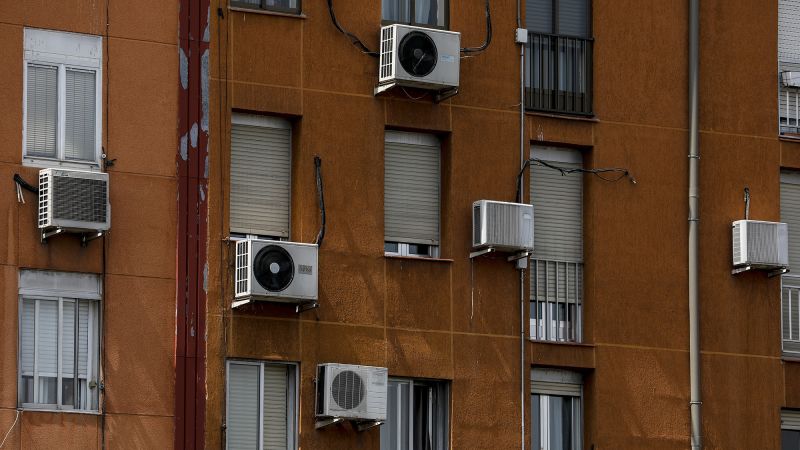Europe's Scorching Summers: Why Air Conditioning Remains Scarce?

Welcome to your ultimate source for breaking news, trending updates, and in-depth stories from around the world. Whether it's politics, technology, entertainment, sports, or lifestyle, we bring you real-time updates that keep you informed and ahead of the curve.
Our team works tirelessly to ensure you never miss a moment. From the latest developments in global events to the most talked-about topics on social media, our news platform is designed to deliver accurate and timely information, all in one place.
Stay in the know and join thousands of readers who trust us for reliable, up-to-date content. Explore our expertly curated articles and dive deeper into the stories that matter to you. Visit Best Website now and be part of the conversation. Don't miss out on the headlines that shape our world!
Table of Contents
Europe's Scorching Summers: Why Air Conditioning Remains Scarce?
Europe is sweltering. Record-breaking heatwaves are becoming increasingly frequent, transforming once-familiar summers into dangerous, life-threatening periods. Yet, despite the rising temperatures and undeniable health risks, air conditioning remains surprisingly scarce across much of the continent. Why is this the case, and what are the implications for the future?
This isn't simply a matter of personal preference. The lack of widespread air conditioning poses significant public health challenges, impacting vulnerable populations like the elderly and those with pre-existing health conditions. Heat-related illnesses and deaths are on the rise, highlighting the urgent need for a change in approach.
Historical and Cultural Factors
One key reason for the relative lack of air conditioning in Europe stems from its historical climate. Unlike in many parts of the United States or Asia, where hot summers are the norm, Europe has traditionally experienced milder temperatures. This historical context shaped building design and societal expectations. Older buildings, often lacking the infrastructure necessary for easy AC installation, are widespread across European cities. Furthermore, a cultural preference for natural ventilation and open windows has persisted, contributing to a slower adoption of air conditioning technology.
Energy Efficiency Concerns and Environmental Impact
Environmental concerns play a significant role. Air conditioning units are known for their high energy consumption, contributing to greenhouse gas emissions and exacerbating climate change – a vicious cycle. This has led to policies promoting energy efficiency and alternative cooling methods, such as improved insulation and passive cooling techniques. While laudable in their intent, these initiatives haven't always kept pace with the accelerating effects of climate change.
Furthermore, the existing power grid infrastructure in some European countries may struggle to cope with a sudden surge in air conditioning usage, leading to potential power outages during peak demand.
Economic Factors and Affordability
The cost of purchasing and installing air conditioning systems presents another barrier. While prices have decreased in recent years, air conditioning remains a significant investment for many households, especially in countries with lower average incomes. This economic factor disproportionately affects vulnerable populations, widening existing inequalities.
The Path Forward: A Balanced Approach
Addressing Europe's air conditioning deficit requires a multifaceted approach. This includes:
- Investing in energy-efficient air conditioning technologies: The development and widespread adoption of more sustainable and energy-efficient AC units is crucial. Research into technologies like natural refrigerants is key.
- Improving building insulation and passive cooling: Retrofitting existing buildings with better insulation and implementing passive cooling strategies, such as improved ventilation and shading, can significantly reduce the need for air conditioning.
- Developing smart grids: Upgrading power grids to handle increased energy demand during heatwaves is essential to prevent widespread power outages.
- Public health awareness campaigns: Educating the public about heat-related illnesses and the importance of staying cool during heatwaves is crucial. This includes providing support to vulnerable populations.
- Policy incentives for energy efficiency: Government incentives and regulations can encourage the adoption of energy-efficient cooling solutions.
The increasingly frequent and intense heatwaves across Europe underscore the urgent need to reconsider the continent's approach to cooling. A balanced approach that considers both environmental sustainability and public health is paramount to ensuring the safety and well-being of European citizens in the face of a changing climate. The time for decisive action is now. What steps do you think are most important? Share your thoughts in the comments below.

Thank you for visiting our website, your trusted source for the latest updates and in-depth coverage on Europe's Scorching Summers: Why Air Conditioning Remains Scarce?. We're committed to keeping you informed with timely and accurate information to meet your curiosity and needs.
If you have any questions, suggestions, or feedback, we'd love to hear from you. Your insights are valuable to us and help us improve to serve you better. Feel free to reach out through our contact page.
Don't forget to bookmark our website and check back regularly for the latest headlines and trending topics. See you next time, and thank you for being part of our growing community!
Featured Posts
-
 Idaho Murders Cnn Airs Kohbergers Admission Of Guilt
Jul 04, 2025
Idaho Murders Cnn Airs Kohbergers Admission Of Guilt
Jul 04, 2025 -
 Major Recall Kraft Heinz Recalls Oscar Mayer Turkey Bacon Over Listeria Risk
Jul 04, 2025
Major Recall Kraft Heinz Recalls Oscar Mayer Turkey Bacon Over Listeria Risk
Jul 04, 2025 -
 Listeria Scare Kraft Heinz Issues Urgent Recall Of Oscar Mayer Turkey Bacon
Jul 04, 2025
Listeria Scare Kraft Heinz Issues Urgent Recall Of Oscar Mayer Turkey Bacon
Jul 04, 2025 -
 4 Juli 2025 Perayaan Dan Peringatan Nasional And Internasional
Jul 04, 2025
4 Juli 2025 Perayaan Dan Peringatan Nasional And Internasional
Jul 04, 2025 -
 Kate Hudson And Dakota Johnson Enjoying A Much Needed Getaway
Jul 04, 2025
Kate Hudson And Dakota Johnson Enjoying A Much Needed Getaway
Jul 04, 2025
Latest Posts
-
 Torture Claims In El Salvadors Mega Prison Kilmar Abrego Garcias Legal Team Speaks Out
Jul 04, 2025
Torture Claims In El Salvadors Mega Prison Kilmar Abrego Garcias Legal Team Speaks Out
Jul 04, 2025 -
 10 Years In The Making Gate Season 2 Officially Greenlit For Production
Jul 04, 2025
10 Years In The Making Gate Season 2 Officially Greenlit For Production
Jul 04, 2025 -
 Husbands Chat Gpt Fueled Spiritual Awakening Strains Marriage A Modern Dilemma
Jul 04, 2025
Husbands Chat Gpt Fueled Spiritual Awakening Strains Marriage A Modern Dilemma
Jul 04, 2025 -
 Squid Game Creator Addresses Us Remake Rumors And Explains That Unexpected Cameo
Jul 04, 2025
Squid Game Creator Addresses Us Remake Rumors And Explains That Unexpected Cameo
Jul 04, 2025 -
 Botox Scandal County Durham Women Report Illnesses Beautician Offers Public Apology
Jul 04, 2025
Botox Scandal County Durham Women Report Illnesses Beautician Offers Public Apology
Jul 04, 2025
